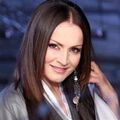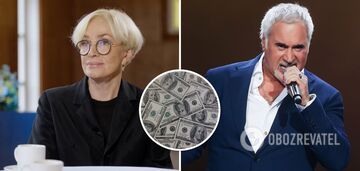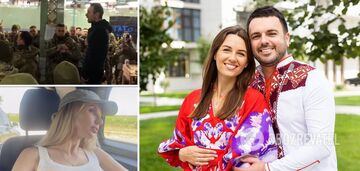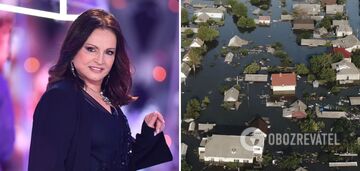
Sofia Rotaru
She was born on August 7, 1947 in the village of Marshintsy, Novoselytsya district, Chernivtsi region (Ukraine).
Sofia Rotaru was born in the family of a brigadier of vines, the second of six children, she brought up her younger brothers and sisters, from a young age she helped her mother and older sister Zina in the household.
Sofia's musical abilities manifested themselves very early. From the 1st grade, she sang in school and church choirs. "It's hard to say when and how music appeared in my life," Sofia Mikhailovna says. - It seems that it has always lived in me. I grew up surrounded by music, it was everywhere: at the wedding table, at gatherings, at parties, at dances..." Her first teacher was her father, who himself in his youth loved to sing and had an absolute musical ear and a beautiful voice.
At school, Sofia learned to play the domra and accordion, took part in amateur art activities and gave concerts in the neighbouring villages. She was especially fond of home concerts: Mikhail Fyodorovich's 6 children made up a fine choir. In this environment she drew the most human, most profound and sincere notes for her future songs. And then, at competitions and festivals, Sofia Rotaru sang as if born with this music, charming intonations of intimate, unique voice. Her father believed in the great future of his daughter. He always said: "Sonya will be an artist." And his faith gave Sofia strength to overcome all doubts about her vocation.
The first success came to Sofia Rotaru in 1962. Victory in the district amateur talent contest opened her way to the regional show. Because of her charming voice her fellow countrymen rewarded her with the title of "Bukovinski Nightingale". The young singer's voice was amazing: she impressed by its power and amplitude, an unusual wealth of sound. In 1963 she won the first degree diploma at the Regional amateur talent show in Chernovtsy. As the winner she was sent to Kiev to take part in the Republican Festival of Folk Talents (1964). In the capital of Ukraine Rotaru was the first again.
After winning the national contest Sofia decided to become a singer and got accepted to the conductor-chorus department of Music College in Chernovtsy.
In 1968, after graduation, Rotaru was delegated as a member of the creative group to Bulgaria in the IX World Festival of Youth and Students, where she won a gold medal and first prize in the competition of folk singers. Bulgarian newspapers were full of headlines: "21-year-old Sofia conquered Sofia". So was appreciated the performance of Ukrainian folk song "On Kameni Stoyu" and Moldavian "I Love Spring", as well as "Step" by A. Pashkevich and "Valentina" by G. Georgitse. The last song was dedicated to the first woman cosmonaut, Hero of the Soviet Union Valentina Tereshkova, who was present in the hall. The chairman of the jury Ludmila Zykina said of Rotaru then: "This is a singer with a great future...".
In 1968 Sofia Rotaru married Anatoliy Evdokimenko, who was a student of the University of Chernovtsy and also a trumpeter in a student band.
In 1971 at Ukrtelefilm, director Roman Alekseev shot a musical film about the tender and pure love of a girl-Goryanka and a Donetsk boy - Chervona Ruta (Chervona Ruta is the name of a flower, taken from an old Carpathian legend. Ruta blooms only on the night of St. John's Eve, and a girl who sees the blooming ruta will be happy in love). Sofia Rotaru became the main character of the film. Songs of composer V. Ivasiuk and other authors were also performed by V. Zinkevich, N. Yaremchuk and other singers. The motion picture was a big success. And when Sofia Rotaru was invited to work in Chernivtsi Philharmonic and create her own ensemble, the name of the ensemble appeared by itself - "Chervona Ruta".
Anatoly Yevdokimenko became the artistic director of the ensemble. Later he graduated from the director's faculty of Kyiv Institute of Culture and became a director of all concert programs of Sophia Rotaru.
The name of the ensemble "Chervona Ruta" was chosen also because it was the name of one of the first songs by the famous composer and poet Volodymyr Ivasiuk. His songs wonderfully combined the beauty and romanticism of the Bukovinian land, the freshness and chastity of the first love, the boundless belief in happiness. Sofia Rotaru considers her meeting with composer V. Ivasiuk to be a lucky gift of fate. Most of his songs were written especially for her. They were modern, but at the same time were built on the multinational melodies of the people living in Bukovyna. It was a new and surprisingly bright word in Ukrainian song culture. The songs of Volodymyr Ivasiuk gave wings to the singer, and with them her variety star began to shine. These songs were and still are played in thousands of concerts in many countries of the world. Many of them became classics of the art of singing, and the song "Chervona Ruta" is still a visiting card of Sofia Mikhailovna.
Chervona Ruta's debut was a performance at Star City in front of Russian cosmonauts. Sofia Rotaru and the ensemble "Chervona Ruta" for the first time declared themselves as outstanding representatives of the whole direction of the national variety arts, the characteristic feature of which is a combination of elements of folk music and modern rhythms in the repertoire and style of performance. Then she sang in Moscow on the stage of the Central Concert Hall "Russia", the Kremlin Palace of Congresses and on the stage of the Variety Theater.
Making her debut in the capital, Sofia Rotaru least of all resembled a timid newcomer. By that time she was quite a mature master. The external restraint singer, leaving no room for fussiness and unnecessary gesticulation, in harmony with the flight of her over-expressive voice. She sang as she used to since childhood: selflessly, not sparing himself or his voice, playing with him as a rider on an unbridled horse - now bending to his will, then letting fly at full tilt. She was distinguished by her sincerity and temperament multiplied by a surprisingly organic synthesis of three musical elements: Moldavian, Ukrainian, Russian - a combination that no one else has managed to master.
All this was the beginning of wide recognition of the singer. Since 1971 she started a countdown of her professional creative activity.
In 1972, Sofia Rotaru and Chervona Ruta participated in a tour of Poland with the program "Songs and Dances of the Country of the Soviets". In 1973, the Golden Orpheus contest was held in Burgas (Bulgaria). Rotaru won first prize there, singing "My City" by E. Doga and the song in Bulgarian "The Bird" by T. Rusev and D. Demyanov. 1973 also brought her the title of Honored Artist of the USSR. Songs in her performance "Codra" and "My City" in Moldavian language were recorded in the film "Spring Symbols - 73". The song "My City" became a laureate of the festival "Song-73".
In 1974 Sofia Rotaru graduated from Chisinau Institute of Arts named after Muzychesku and became a laureate of the festival "Amber Nightingale" in Sopot (Poland), where she performed "Recollection" by B. Rychkov and "Vodograi" by V. Ivasiuk. The singer received the second prize for her performance of the Polish song from the repertoire of Halina Frąckowiak "Someone" (Russian text of A. Dementieva). In 1975 she became a soloist of the Crimean Philharmonic.
Starting from the 1970s, songs performed by Sofia Rotaru constantly became laureates of "Song of the Year". They were created in collaboration with the best composers and poets of the country. Arno Babadjanian wrote "Give Me Back the Music", Alexey Mazhukov - "And the Music Sounds", Pavel Aedonitsky - "For Those Who Are Waiting", Oskar Feltsman - "For Those Who Are Waiting" and others.Oscar Feltsman - "Only for You", David Tukhmanov - "In My Home" and "Waltz", Yuri Saulsky - "Ordinary Story". Sofia Rotaru was the first performer of songs by composer Yevgeny Martynov, such as "Swan Fidelity" and "Ballad of a Mother". Many years of creative cooperation connect the singer with the composer Vladimir Matetsky. This collaboration began with the song "Lavender", written by V. Matetsky in 1985 for her duet with Jaak Joala and still is popular. "Lavender" was followed by "The Moon, the Moon", "It Was, but It's Gone", "Wild Swans", "Hutoryanka", "Zasentyabrilo", "Moon Rainbow", "Stars Like Stars" and many others.
Sophia Rotaru sang more than 400 songs in Russian, Moldavian, Ukrainian, Bulgarian, Serbian, Polish, Italian, English and German. During 30 years of creative activity she passed a long way from a beginner and unknown singer from Bukovina to the People's Artist of three states. Her songs have always been hits, and they were always sung and picked up by the people. Many of them became classics of Ukrainian and Russian pop.
Her main appeal to the audience is that the singer stays true to the folk manner of singing. Folkness is manifested in the setting of voice, and in simplicity, restraint behavior on stage, and finally, in the choice of repertoire: Rotaru songs are always lyrical, sung. They have no random, meaningless, empty words. The singer's repertoire includes songs of different genres, but almost always - a dramatic story, a dramatic melody. According to Sofia Mikhailovna, a song for her - "a little novel with its own world of feelings, dramatic structure, characters.
In 2001, Sofia Rotaru performed in a new solo concert program "My Life - My Love! The expressiveness of the 1970s was joined by the lyricism of the 1980s and the drive of the 1990s. and the current game of halftones, on which Rotaru the director, Rotaru the singer builds her program, combining new songs and hits of the past years, re-read and refracted from the point of view of today. Many of her songs, no matter how many years ago they were sung, do not fit into the "retro" format, continuing to live in each new concert program of the singer.
Sofia Rotaru toured in many countries of Europe, Asia and America, in Australia.
After the already mentioned "Chervona ruta" she starred in musical television pictures "The Song Will Be Among Us" (1974), "Sofia Rotaru Invites You" (1985), "Monologue about Love" (1986), Golden Heart (1989), Caravan of Love (1990), New Songs about the Main Thing (1996), 10 Songs about Moscow (1997), and also starred in the feature films Where Are You, Love?"(1980, the film won a prize at the All-Union Film Festival in Vilnius, 1981) and The Soul (1981).
More than 25 vinyl records and 10 CDs with the songs performed by Sophia Rotaru were released.
S.M. Rotaru is People's artist of the USSR (1988), People's artist of Ukraine (1976), People's artist of Moldova (1983), laureate of the republican Komsomol prize named after N. Ostrovski (1977), laureate of the Lenin Komsomol Award (1978), laureate of the Ovation Prize (1996, 2000 - for her special contribution to the Russian variety show), laureate of the Klavdia Shulzhenko Prize "The Best Pop Singer of 1996" (Moscow) (Moscow), laureate of the All-Ukrainian Prize in music and mass spectacle "Golden Firebird-99" (1999), Prometheus Prize (2000, Kiev), holder of honorary prize of President of Ukraine for outstanding contribution in development of pop art "Song Vernisage" (1997, Kiev). In 2000 in Kiev she was named Man of the Year and the best Ukrainian pop singer of the XX century and she was awarded with the title "Golden Voice of Ukraine".
In 1996 in Yalta the name star of Sofia Rotaru was placed on the square in front of the "Jubilee" concert hall. In May 2002 it was laid the name star of the singer ("Star of Ukraine") on the Walk of Stars near the International Culture and Arts Centre in Kiev, giving her the honorary diploma and badge "Star of Ukrainian Popular Music", in March 2003 opened the name star of S.Rotaru on the Walk of Stars in front of SCCR "Russia".
On the 7th of August 2002 the President of Ukraine L.D. On August 7, 2002 the President of Ukraine L.D.Kuchma signed the Decree on conferring to S.M. Rotaru the title of the Hero of Ukraine.
She was awarded with the Order of Honour (1980), the Order of Friendship of Nations (1985), "For Merit to the Motherland" (2002), the Honorary decoration of the President of Ukraine (1996), the Order of Moldova (1997), the Order of Honour of Ukraine (2002) and with the Order of Saint Nikolas the Wonderworker (1998), Saint Princess Olga I and III classes (2002, 1999). Rotaru is an honorary citizen of the Autonomous Republic of Crimea (1997) and the city of Chernivtsi (1998).





















